Biden Admin Takes Steps to Add 100K Affordable Housing Units
Multi-pronged approach would apply to multifamily and single-family properties
By Chava Gourarie September 2, 2021 2:45 pm
reprints
The Biden administration is reupping several federal programs, and tweaking others, in order to add to the country’s affordable housing stock, the White House announced Wednesday.
The laundry list of initiatives is to help finance the development and preservation of 100,000 units of multifamily and single-family housing over the next three years.
Among the initiatives is the relaunching or expansion of several existing programs designed to encourage affordable multifamily housing development, directing more financing towards manufactured and 2- to 4-unit homes, and making it easier for private homeowners and nonprofits to compete with investors.
The final prong is in response to a new element to the housing affordability crisis. In the last 18 months, home prices rose astronomically across the country, while, at the same time, a tremendous amount of institutional capital poured into single-family housing. In 2020, 1 in 6 homes were purchased by an investor owning 10 houses or more, according to a report from Redfin, cited by the Biden administration, making it difficult for individuals to compete.
In terms of affordable multifamily housing development, the administration has revived or expanded three programs.
First, the Treasury Department and the Department of Housing and Urban Development (HUD) will relaunch the HUD Risk-Sharing Program, which will help state housing finance agencies finance affordable multifamily development.
In addition, the Federal Housing Finance Agency (FHFA) will increase the amount that Fannie Mae and Freddie Mac are allowed to invest in Low-Income Housing Tax Credits (LIHTC), one of the country’s longest-running methods for financing affordable multifamily development. The cap will be doubled from $500 million each to $1 billion each.
Third, the Treasury Department is making $383 million available for affordable housing financing through a program called the Capital Magnet Fund, a competitive grant program for nonprofits and community development institutions.
To increase affordable homeownership, the FHFA will allow Fannie and/or Freddie to provide loans on manufactured homes and more 2- to 4-unit homes.
To compete with institutional investors, the Biden administration is offering a few ways to increase the inventory of housing available to homeowners and nonprofits. It is simplifying the process of selling foreclosed homes insured by the Federal Housing Administration (FHA); increasing the amount of time that private owners get to buy homes owned by HUD or Fannie and Freddie, an inventory of 12,000 homes; and giving nonprofits priority to buy distressed HUD-owned multifamily properties, which number 1,700.
Chava Gourarie can be reached at cgourarie@commercialobserver.com.



